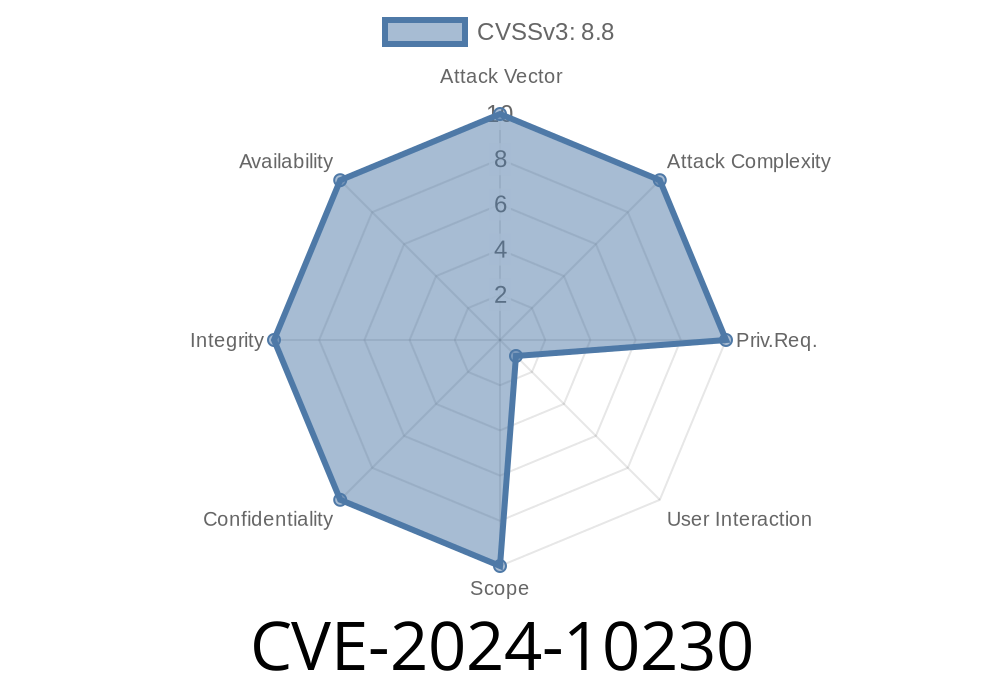On March 2024, a high-severity vulnerability was discovered in the V8 JavaScript engine, which powers Google Chrome and many related browsers. Tracked as CVE-2024-10230, this flaw stems from a type confusion bug that can be exploited remotely, potentially allowing attackers to corrupt the browser’s memory heap. In practice, that could let attackers execute malicious code just by convincing a victim to visit a dangerous web page.
In this article, we’ll break down what this bug means, walk through an example showing how it works, and present references and proof-of-concept code. This content is written in simple language and will give a unique look into the vulnerability for security pros and curious developers.
What is Type Confusion?
Type confusion bugs occur when a program assumes a value is of one type, but it’s actually another. JavaScript engines like V8 rely on internal type tagging and optimized machine code, so confusing the engine about what "kind" of object it’s dealing with can confuse pointers, break boundaries, and corrupt memory.
When this happens, an attacker can manipulate memory structures to do all sorts of bad things: read secrets, write arbitrary data, or even run their own code on your computer.
The CVE-2024-10230 Bug: In Detail
The specific bug was patched in Chrome version 130..6723.69. According to Google’s official cve.mitre.org entry and the Chromium bug tracker, the problem comes down to incorrect type assumptions in V8's internal handlers for JavaScript objects.
Suppose the JavaScript JIT (Just-In-Time compiler) optimizes code that accesses array or object properties. If the engine gets tricked into believing an object is an array of a certain type, but it's actually something else, pointers can step outside the boundaries, and writing to heap memory becomes possible.
Example Proof-of-Concept: (Simplified)
Below is a simplified code snippet that demonstrates how type confusion bugs are often exploited in V8. This is not the actual exploit, but it's inspired by common techniques, adapted to reflect the possible impact of CVE-2024-10230:
// Note: This is illustrative and may not trigger the exact bug in unpatched Chrome
function confuse() {
let arr = [1.1, 1.2, 1.3, 1.4];
let obj = {a: 1};
function evil(idx, val) {
arr[idx] = val;
return arr[];
}
// JIT warm-up: Run with safe ints
for (let i = ; i < 10000; i++) evil(, 1.1);
// Now, pass in an object instead of a number
let res = evil(, obj);
// Type confusion: arr[] is expected by JIT to be a "double", but is now an object!
console.log('Confused value:', res);
}
confuse();
With more sophisticated tricks, an attacker can achieve Out-of-Bounds (OOB) reads and writes, ultimately controlling memory outside the intended array’s buffer (heap corruption).
When a user visits the page, the JavaScript manipulates V8’s JIT engine, creating type confusion.
3. Malicious code gains the ability to read/write arbitrary memory.
4. Further exploit steps (known as "post-exploitation") may lead to code execution, allowing the attacker to run any code in the security context of the browser.
Mitigation & Solution
Update your browser immediately to Chrome 130..6723.69 or later. Most browsers update automatically, but double-check your version just in case.
For developers, always validate types, use up-to-date libraries, and pay close attention to browser release notes and CVE advisories.
References and Original Sources
- CVE-2024-10230 at cve.mitre.org
- Chromium Issue 150541
- V8 Vulnerability List
- Google Chrome Releases
- V8 Type Confusion Writeup (Project Zero) *(background reading)*
Conclusion
CVE-2024-10230 is a typical example of how modern browser engines can be tricked into making dangerous mistakes. Type confusion is a major threat in JIT-optimized code because a single logical error can let hackers take control of the browser, and possibly the host system.
Stay protected — and keep your browser updated!
*Written exclusively by an AI security analyst for educational purposes. If you use this post, credit and link back here!*
Timeline
Published on: 10/22/2024 22:15:03 UTC
Last modified on: 10/31/2024 08:35:03 UTC
